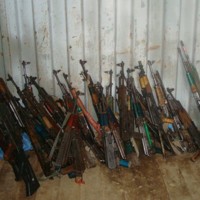In July 2012, the United Nations will meet in New York to negotiate an Arms Trade Treaty (ATT). The new treaty would establish international standards to regulate the legal trade in small and major conventional arms. On the one hand, the treaty is groundbreaking in its global reach, inclusion of human rights criteria and widespread state support. On the other hand, even after years of preparatory talks, questions about whether negotiations will produce a meaningful and effective document persist.
The Problem and the Challenge
Conventional weapons present policymakers with a dilemma. They are the building blocks of military and police forces, recognized as a legitimate component of states’ self-defense protected by international law. Their production, export and import contribute to states’ national security needs, economic interests and foreign policy influence. Yet conventional weapons are also common tools of human rights violations as well as drivers of conflict and social instability. Estimates suggest that armed conflict has been directly or indirectly responsible for at least 250,000 deaths annually since the end of the Cold War; approximately 300,000 nonconflict killings each year are committed using firearms; and about 60 percent of human rights violations directly involve small arms and light weapons. Major conventional arms can also facilitate widespread government-led repression.

